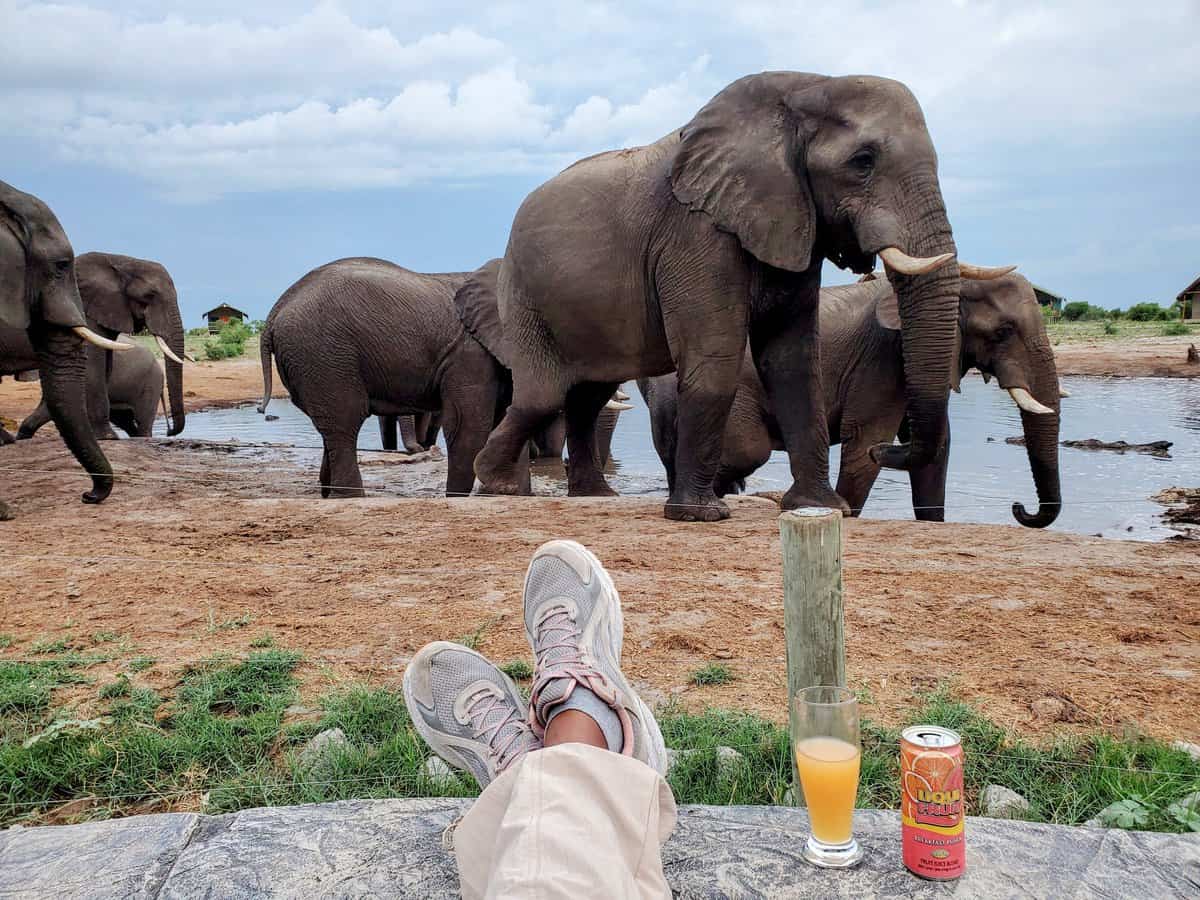If You’ve Ever Been Afraid To Say No…

About 9 months ago, I made a connection with someone online while marketing the initial launch of my first book, and he basically lent me his audience and allowed me to promote to them, which I was very grateful for.
A few months later, he followed up with me and asked how my book sales were going, and said he’d like to discuss some additional marketing ideas.
One of my eyebrows began to raise, but due to the geographic distance between us, I felt safe enough to at least hear him out over the phone, and was actually somewhat put at ease based on how smoothly the call went.
He then followed up again about a week after that.
He asked me to make a donation to his charity, which I, for whatever reason, initially felt wary of, but also indebted to do.
He also asked me to record a video speech, talking about the topics of my book, that he would play at his next youth empowerment event.
Honestly, I didn’t have time, but it seemed like an overall good cause and a way to scratch the back of the person who just scratched mine, so I agreed to do this as well.
This is when things started to turn.
I told him I was spending time on vacation with family but would do both the donation and the video, and would get back to him in a couple weeks when I’m done with vacation.
I take quality family time, soft discipline, slow productivity, self care, and recuperation seriously, so when I say I’m off, I’m off.
But during this time that I told him I was off, the communication multiplied to a very uncomfortable degree that ultimately ended in my backing out of everything.
What initially felt like an ask from him, started to feel like a demand, and what initially felt friendly started to feel strange.
All of a sudden, I was bombarded with an endless barrage of calls, questions, and messages multiple times a day.
The messages ranged from questions regarding what I’d agreed to do (but already told him I’d follow up on later), to only two-word greetings, as if just trying to get my attention.
The overly aggressive frequency of communication and flagrant lack of respect for my boundaries and schedule are what ultimately led me to tell him I was backing out of the whole thing–no more donation and no more video.
Unfriend, block, delete.
While that was the decision I ended up making, I felt very uneasy about it and went back and forth with myself (and others who would listen) on whether or not I did the right thing.
But here’s what I learned about saying no…and about turning a yes into a no…
Principles must sometimes be interchanged.
Ever since I read The Four Agreements (which you should too if you haven’t already, excellent book), I have adopted for myself the principle of being impeccable with your word–to say what you mean, to do what you say you are going to do, and to follow through with your promises.
It has been very important for me to remain in integrity with that principle, and any lapse in doing so feels like a stinging betrayal to myself, accompanied with shame.
But I also have other principles…namely, “trust your intuition,” and “prioritize your peace.”
And though I felt guilty at the idea of backing out of our informal agreement, I also felt uneasy and pressured about the whole situation.
In this situation, it was not possible for me to abide by all of my principles at the same time.
I was upset about backing out of my commitment because it violated my principle of being impeccable with my word.
But what I didn’t realize at the time was that by carrying on with that commitment, I was violating my other principles of trusting my intuition and prioritizing my peace.
“Trust your intuition” and “prioritize your peace” at that time needed to supersede “be impeccable with your word.”
Sometimes, in following one of your principles, you have to go against another.
Principles cannot replace discernment.
As a natural overthinker, I like–no, LOVE–anything that makes it easier for me to make a decision, or better yet, eliminates the need for me to make a decision altogether.
As a result, I’m very guilty of aggressively creating and borrowing mental models, adopting principles to adhere to, and trying to come up with hard and fast rules for life.
This helps me make sense of things, feel a sense of control and peace, and is done in an effort to eliminate my need for decision-making.
But, that’s not possible.
Principles are great to have, but principles are not absolute.
Sometimes you have to choose what makes sense for the moment, not for eternity.
There is no one-size-fits-all principle that can be applied to every circumstance or fork in the road.
As mentioned previously, your principles will not always work in tandem with one another.
When we reach a fork in the road in life, it’s not just about choosing which principle to follow, it’s sometimes about choosing which principle to let go of.
You have to choose what is most important and what makes the most sense for the specifics of each immediate situation.
Peace can be delayed.
Time both sharpens and widens the lens through which we can see things.
Our ability to more clearly see situations, and our perspective, both increase with time.
With that increased clarity, comes an increased peace that we may not initially feel when we make an uncomfortable decision.
At first, I felt uneasy and guilty about what felt to me like backing out of a commitment.
And those feelings slowly started to wane over time, and I started to feel a peace as more rational reasons came to me, assuring me of my decision.
Sometimes it takes time to make peace with a decision and to see things from all angles.
So if you say no, and feel uneasy about it in the moment, it doesn’t mean that peace is not available to you, it could just mean that peace is not here yet, but is on its way.
Less discomfort now can mean more discomfort later.
When I “broke up with” this man I had a business relationship with, I felt uneasy in my body at the thought of what I looked at as backing out of a commitment.
Literally, I could feel it in my stomach, in my muscles–manifesting as aches, tightness, tension, and pain.
But here’s the thing–I wouldn’t have had to back out if I had just said no in the first place like I wanted to.
Initially, it’s easier to make the decision that won’t rock the boat.
Initially, it’s easier to agree to something that others will feel okay with and won’t push back on.
Initially, it’s easier to say yes than it is to say no.
In that moment, when he initially made me the proposition, I wanted to avoid the discomfort of saying no, so I said yes, taking the emotional and mental easy road…or so I thought at the time.
Ironically, you make things worse and harder for yourself in the long term by trying to take what at the time feels like the easy path.
You may try to avoid discomfort now, but in doing so, create greater discomfort for yourself in the future.
In the grand scheme of things, no matter how uneasy you may feel, the beginning offers you the easiest no.
Once you get further and further down the road to what you’ve committed to do, it gets harder and harder to say no.
Your integrity with yourself is more important than an inconvenience to someone else.
I’ve worked hard to amplify my voice, to stand up for myself, to increase my courage to stand firm in my own decisions, to banish people-pleasing tendencies, to fearlessly say yes, to fearlessly say no, to fearlessly make the best decision for myself without worrying about what others will think or feel…
But here I was, feeling strong-armed into saying a yes that I really wanted to be a no.
I didn’t have the time, and I initially felt wary of the whole thing, and I started feeling pulled into the orbit of someone else’s priorities and schedule, and away from my own.
I didn’t want to inconvenience someone else, but in prioritizing that, I was putting myself in a position of undoing the work I’ve done on myself.
Sometimes, we let ourselves down in order to avoid letting others down.
But that doesn’t mean that it’s right.
It should be the other way around.
Sometimes, we have to be okay with letting other people down in order to avoid letting ourselves down.
You have to be okay with making a decision that’s best for you, and prioritizes your own personal principles, even if it means inconveniencing someone else.
You don’t owe anyone anything.
Ever.
No matter what.
If a good person does something good for you, and it is within your power to do something good for them, you should.
And if you have a properly functioning heart and soul, you will want to.
But you need to know that you don’t have to.
It’s good to be grateful.
It’s good to show your gratitude with reciprocated acts of kindness.
But the same way that when you do something for someone, it should never be with the intention of getting something back from them, when someone does something for you, it should never be with the intention of getting something back from you.
That’s what we call entitlement and manipulation.
And neither is okay.
You give because you want to give.
You help because you want to help.
And you put your oxygen mask on first.
This is the part that we forget.
The feeling of obligation to reciprocate a good deed, or to “be nice,” can cloud your judgment and cause you to make a different decision than you would otherwise make.
Never do anything leading with the feeling that you owe it to someone.
Doing this can cause you to put their needs above your own in a way that is to your own detriment and/or counter to your personal principles and integrity.
“You helped me, I would love to help you…if I can.”
is different than…
“You helped me, I HAVE to help you…no matter what the consequences are for me.”
If you enjoyed reading this article as much as I enjoyed writing it…
Every new subscriber gets a free habit tracker & you’ll never miss another mindset shift! It’ll be your favorite email you get every week 😊




